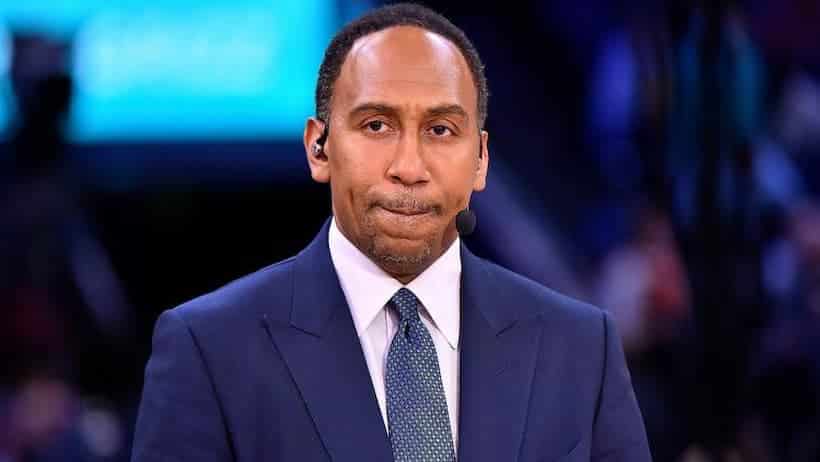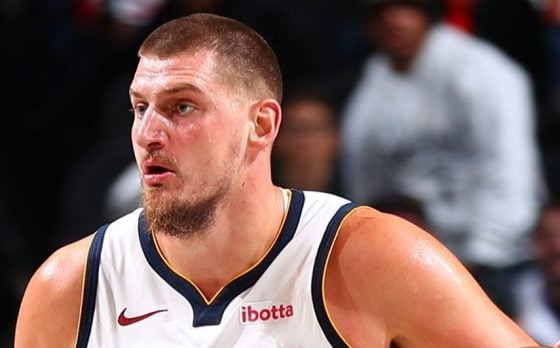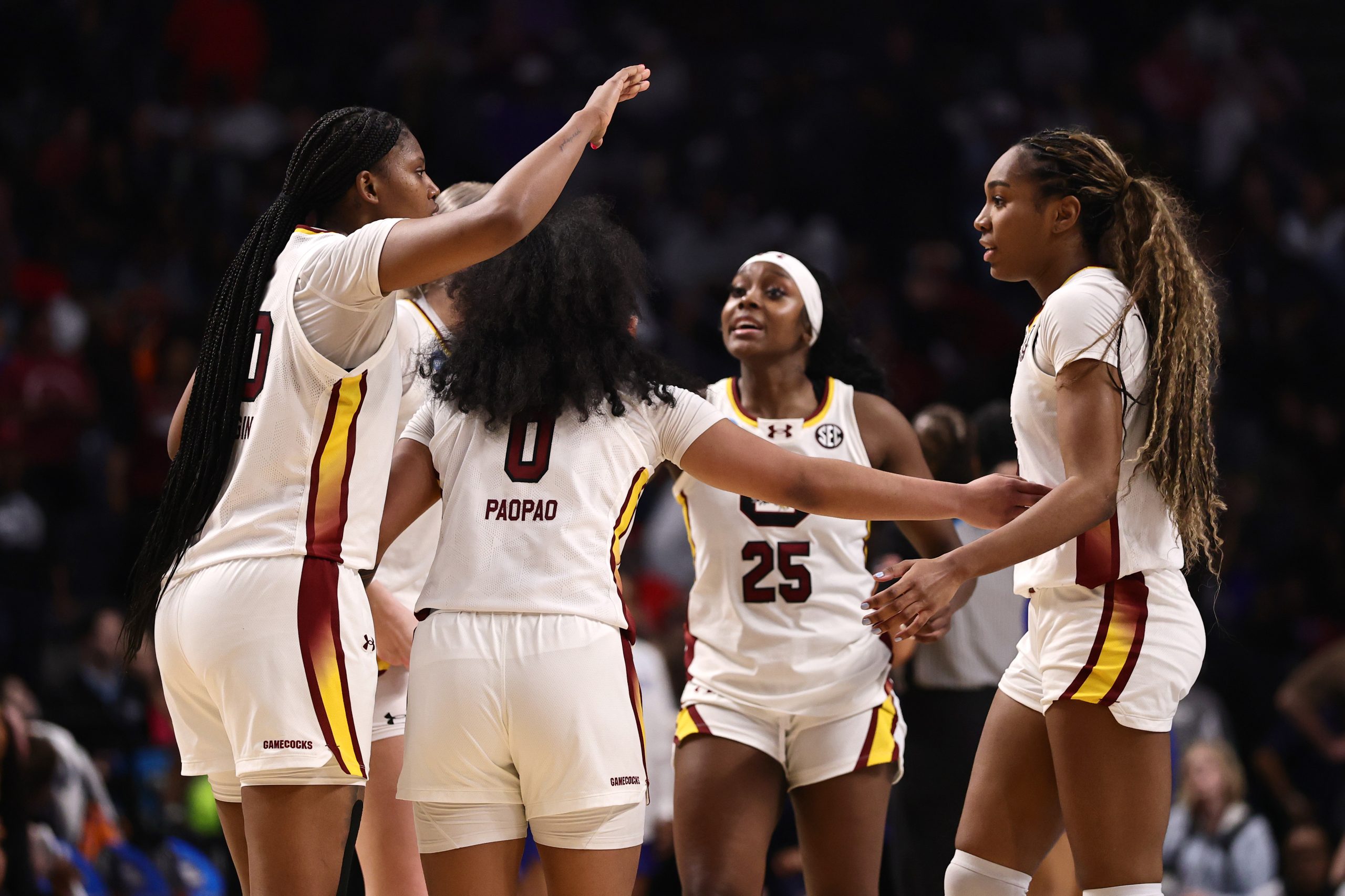Neemias Queta exited the hallway between the Celtics and Raptors’ locker rooms at TD Garden last month with a Toronto jersey hanging over his shoulder wearing a smile on his face. He had tracked down Davion Mitchell, his fellow Sacramento Kings draft pick from 2021, and asked for his uniform.
“What’s up?,” Mitchell said to him.
“Lemme get that,” Queta replied.
“Bet. No question,” Mitchell said. “I got you.”
“Usually I have to ask our equipment people can I give my jersey up? But … that’s my dawg,” Mitchell told CLNS/CelticsBlog later.
Photo by Rocky Widner/NBAE via Getty Images
Mitchell and Queta led Sacramento’s Summer League team to the championship one month after the team drafted them, with Queta becoming the first player ever selected from Portugal. While he went 30 picks after Mitchell, the guard credited Queta with the win.
They defeated Payton Pritchard, Aaron Nesmith, Joe Mazzulla and Boston’s summer squad, 100-67, to secure the title. Two years later, the Kings waived Queta after only twenty NBA games across two seasons to sign JaVale McGee, despite Queta finishing top-3 in G-League MVP voting the previous year. Queta quickly joined Boston on a two-way deal.
“Neemy was always nice to me,” Mitchell said. “I think it was just a matter of opportunity. He’s showing what he’s been doing. He’s a smarter player. He’s a stronger player, of course. He got stronger over the years, but he was always nice to me.”
As one of the league’s great bench stories this season, having earned a three-year deal last year by nearly reaching the 50-game NBA limit on his two-way, Queta started five games effectively in Kristaps Porziņģis’ absence. He holds no hard feelings toward the Kings, appreciating the lessons he learned from Mitchell, Domantas Sabonis and Mike Brown’s coaching staff.
Like Mitchell, Queta understood the uphill battle for playing time in Sacramento, but he chose another crowded front court over multiple other opportunities in free agency. He liked the Celtics’ winning track record, Boston’s proximity to his native Portugal and a friend he used to play with on Benfica resided in the city.
“Was I surprised? Not really,” Mitchell said of Queta being cut by the Kings. “I’m kinda glad they did because he wasn’t ever gonna get an opportunity there. Never. Even the backup big now (Alex) Len only play like sometimes eight minutes per game … it was up-and-down and Neemy didn’t need that. I feel like Neemy just needed a a chance to to learn from some vets like Al Horford. A really good vet room … being around a championship team.”
Making his first start
Joe Mazzulla pulled aside Jordan Walsh, Baylor Scheierman and Neemias Queta late in training camp after practice. They discussed how minutes wouldn’t be there for them early in the season, but stressed how they could be called upon at any time. He reminded Queta how he won multiple games for the Celtics last winter when injuries struck. He averaged 10.7 points and 10.0 rebounds per game across three appearances last December before posting 5.8 PPG, 3.8 RPG and 1.5 blocks per game in four games between late January and February.
The Celtics spent two games at Summer League experimenting with defensive looks that best suited him, anticipating a larger role depending on their strategy. In Sacramento, Queta mostly dropped in pick-and-roll coverage, while the Celtics expected him to shift to switching and roaming roles on the fly. It wasn’t easy.
“It’s tough because I don’t really know what my role is,” Queta told CLNS/CelticsBlog. “There could be a night I could just be out here blocking shots. I could be out here guarding the best player, it depends on the matchups, too. We could be switching, we could be in coverage, we could be in different positions … every night is different. It’s just about being used to those coverages … I really don’t try to shy away from any of them. Whenever the challenge comes, I get ready for it. I like (roaming), because I feel like I can disrupt a lot of things, being as big as I am, just being off the weak side, coming over and help, making sure I have my teammate’s backs.”
“I feel like my mind was racing 1,000 miles per hour (when I arrived), but (Charles Lee and the coaches) did a great job with me the whole time.”
:no_upscale()/cdn.vox-cdn.com/uploads/chorus_asset/file/25786156/2150371334.jpg)
Photo by Brian Babineau/NBAE via Getty Images
Mazzulla pulled Queta less than five minutes into his first NBA start at Atlanta after a long Jrue Holiday pass flew over his head and out-of-bounds. Mazzulla didn’t like how Queta handled the opening stint, and wanted to emphasize how highly they viewed his potential.
Boston had bumped Queta ahead of reliable defenders Luke Kornet and Xavier Tillman Sr. for most of the season’s opening stretch. His offensive rebounding, rolling and rim protection ability helped immensely in Porziņģis’ absence. That night, he eventually posted 10 points and seven rebounds in a 30-point win. Boston won his 23 minutes by 31 points.
In Porziņģis’ first game back against the Clippers, which Al Horford rested, Porziņģis and Queta staggered minutes. No defender in the NBA switched onto guards for a greater percentage of their minutes into November. The Celtics weathered his mistakes, and even though he’s 25, years beyond when most players get talked about for their potential, Boston still believes in him. Playing through his growing pains and giving him a three-year deal illustrate that.
Queta’s childhood didn’t feature the robust basketball development of his peers. He discovered the sport at 10. “I had no idea what basketball was,” Queta told CLNS/CelticsBlog, explaining the first trip he took to the Barreirense sporting club near where he grew up. “I had never even watched before, or had a basketball before.”
:no_upscale()/cdn.vox-cdn.com/uploads/chorus_asset/file/25784849/4fd02572_ce76_4490_b3eb_cb280285b2e5.jpg)
Eric Peterson
Return to Portugal
Queta hoped to bring the NBA championship trophy to Portugal this past summer, and while that didn’t happen, he reunited with family and friends and celebrated becoming the first Portuguese NBA champion with a youth basketball clinic. Those around him remembered how he embraced the pressure that came with becoming the country’s first pro. He plans to bring his championship ring there soon. Former Utah State teammate and Portugal native Diogo Brito looks forward to competing in EuroBasket alongside Queta next summer.
“When he was 16-18, that’s when he really started to become a top prospect in the country,” Brito said. “Portugal is not really a big basketball country. So the people from the basketball community, (if) they know a player is playing in the US, they follow that … once the draft came and he got drafted, then he became famous outside of just the basketball community and he’s basically a public figure now … Portugal doesn’t have a big basketball tradition, which is changing now and a lot is due to this guy. A lot of kids now, they see we have a Portuguese player in the NBA … (and) start thinking that they can make it too … as soon as he got drafted, the talk around basketball in Portugal just became much bigger.”
Eric Peterson, the first college coach to recruit Queta, learned about him from contacts he developed scouting overseas while coaching junior college. He had asked talent evaluators, including a Wizards scout, to tell him five names people overlooked at the time. Peterson recalled them all mentioning Queta.
Tape featuring Queta at 190 pounds and underdeveloped less than 10 years after picking up the sport didn’t impress. Some other schools expressed interest, but only Utah State jumped through the necessary hoops to recruit and enroll him late in the summer. They needed a center, and Craig Smith, the school’s head coach at the time, glanced at the footage and saw a future pro.
Queta, who likes to keep a low-key profile when he’s home, said he didn’t feel overly famous in his native country this summer. Peterson saw a different person when he visited Vale da Amoreira outside Lisbon six years ago. People recognized Queta driving around. Children crowded him when he stepped out of the car near his house. In a later visit, watching him play for the national team, Smith saw cardboard cutouts with Queta’s face on them and Portugal uniforms sold with his name on the back. Growing up, Queta watched Netflix to help him learn English, listened to American music and even found American food options.
:no_upscale()/cdn.vox-cdn.com/uploads/chorus_asset/file/25784850/IMG_7076.jpg)
Craig Smith
“I wanted to go to dinner with him and I was like, ‘hey, Neemy, tell me your favorite place,’” Peterson said. “I’m expecting this mom-and-pop place, authentic to Portugal and you know where he took me? American Diner. He wanted to get a burger … he had a Coca-Cola, french fries and an American burger.”
:no_upscale()/cdn.vox-cdn.com/uploads/chorus_asset/file/25784845/IMG_5971.jpg)
Eric Peterson
Brito also helped Queta’s transition to America, arriving in Utah shortly before school started having never visited the US. Peterson remembered the elevation nearly killing Queta during his first workout. Queta didn’t have a winter jacket and his classes began at 7:30 a.m.
He grew home sick, but the dining hall took his mind off that. Shocked by all the options and the ability to return for seconds, Queta didn’t take too long to acclimate to campus. Brito remembered many runs to Chik-fil-A and Rancheritos, a Utah Mexican chain. Queta couldn’t wait to try Culver’s, Five Guys and In-and-Out upon arrival.
Despite his appetite for that junk, it took Queta time to adjust to a weight room regimen and the diet that would help him bulk up. He tested the NBA Draft after a strong freshman year, and felt overwhelmed by the process. Tacko Fall dominated him at the combine, and at 218 pounds, he needed more muscle to make the league. A knee injury he suffered later that summer playing with the national team forced him to focus exclusively on his strength.
:no_upscale()/cdn.vox-cdn.com/uploads/chorus_asset/file/25784846/IMG_2529.jpg)
Eric Peterson
“I always remember sitting there talking to him and he was so humbled,” Smith said. “He kind of had his head down. He’s like, ‘Coach, I’m just not there yet. I’m not ready yet. I wasn’t ready for this,’ and of course, we had been telling him for a year, ‘to get to the NBA, you have to get stronger. You gotta be super committed to the weight room.’ And I wouldn’t say he disliked the weight room, but I wouldn’t say he loves the weight room.”
Draft day
Utah State reached the NCAA Tournament for a second time with Queta in his junior year. Smoothies and a renewed work ethic powered him to over 240 pounds. He became one of the best defenders in the country, able to deter drivers and cover different players with varying coverages that he memorized. Smith leaned on him for adjustments, asking him for advice at halftime.
Quiet off the court, he transformed on it. Teammates grew familiar with his voice, beginning his career telling them he had the paint covered. Other times he argued with Brito in Portuguese until Smith grew tired of it, or yelled at officials until Sam Merrill needed to step in. He demanded the ball so the Aggies could play inside-out through his passing.
:no_upscale()/cdn.vox-cdn.com/uploads/chorus_asset/file/25784852/IMG_2024.jpg)
After games, Queta circled Utah State’s arena, giving high-fives with the team before signing autographs. He stopped to attend their post-game meeting, then returned to sign more. As popular as he grew locally, the team’s social media accounts drew constant interaction from Portugal, as anyone around the Celtics has grown familiar with. Peterson and Smith attended his draft party in 2021, and as they departed, Peterson reminded Smith about when they watched Queta’s film for the first time and Smith quickly declared him a pro.
Now, he’s a champion.
“He’s way stronger,” Merrill told CLNS/CelticsBlog before Celtics-Cavs last month. “He doesn’t even look like the same human.”






